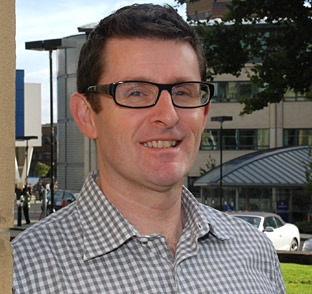Catalyst for green chemistry
Wed, 03 Oct 2012 13:35:00 BST
Huddersfield professor invited to join Northern Sustainable Chemistry Consortium

THE chemical industry makes a massive contribution to the British economy and scientists at the University of Huddersfield have teamed up with colleagues throughout the North of England for research which will help firms make drugs and other products more economically, efficiently and sustainably.
Joe Sweeney (pictured left) is Professor of Catalysis and Chemical Biology and his wide experience of the chemical industry – including collaborations with the multi-nationals AstraZeneca Pharmaceuticals and Pfizer – have played a central role in the University of Huddersfield being invited to join the Northern Sustainable Chemistry Consortium.
The universities of Durham, Leeds, Newcastle and York are the other members of the Consortium, which will pool expertise and resources to investigate catalysis, a process which can enable the production of higher-value chemicals and lead to lower levels of waste in manufacture.
Professor Sweeney added that greater sustainability could also be achieved if less energy were to be used in the production of chemicals and if synthetic replacements could be found for petrochemical-based compounds. These are among the main goals of the Consortium.

“Chemistry and chemistry-related research contribute something like 20 per cent of the UK’s GDP,” said Prof Sweeney. “Therefore, more sustainable and smarter processes, to make both low and high-value chemicals, are excellent candidates for funding from the Government and research councils.”
A consortium, he said, enabled its members to tackle bigger problems and meet new scientific challenges. Although it is Professor Sweeney who has been invited to join the Northern Sustainable Chemistry Consortium, many other University of Huddersfield scientists will take part in the research, including a team of PhD researchers working in the catalysis field.
The expertise of Professor Rob Brown (pictured right), who is Director of the University’s Materials and Catalysis Research Centre, will also be crucial. And a big role will be played by the University team, IPOS (Innovative Physical Organic Solutions), based in the £2.3 million Page Laboratories.
Professor Sweeney’s career as a lecturer and researcher has included several posts at UK universities and overseas – he was a Royal Society Fellow at ETH Zurich. He also received a Royal Society fellowship to work with AstraZeneca for an extended period, before taking up his research chair at the University of Huddersfield in 2011.







